
A trio of classical music composers, each involved in a deadly love triangle, find their lives interwoven fugue-style—and quite stylishly indeed—in Fugue, Tommy Smith’s mesmerizing meditation on music and madness (and musicians driven mad by love), the latest World Premiere from Echo Theater Company and one of the most provocative evenings of theater you’re likely to experience for some time to come.
Carlo Gesualdo (1560-1613), Pyotr Ilyich Tchaikovsky (1840-1893), and Arnold Schoenberg (1874–1951) are the composers in question and each has his own twisted, tempestuous tale to tell.
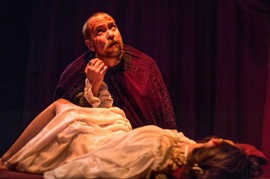 Gesualdo (Karl Herlinger) might have thought himself lucky to have bedded and wedded a bride as young and beautiful as his first cousin Donna Maria d’Avalos (Jeanne Syquia), but perhaps not so fortunate when he learned of her passionate, two-years-and-counting affair with the younger, studlier Fabrizio Carafa, Duke of Andria (Justin Huen).
Gesualdo (Karl Herlinger) might have thought himself lucky to have bedded and wedded a bride as young and beautiful as his first cousin Donna Maria d’Avalos (Jeanne Syquia), but perhaps not so fortunate when he learned of her passionate, two-years-and-counting affair with the younger, studlier Fabrizio Carafa, Duke of Andria (Justin Huen).
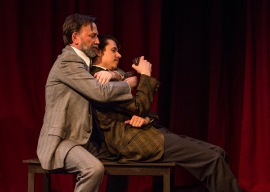 Tchaikovsky (Christopher Shaw) might have thought that marrying former student Antonina Miliukova (Alana Dietze) would cure him of his same-sex desires, but that was before he and his hunky nephew Vladimir “Bob” Davidov (Eric Keitel), three decades his junior, became live-in lovers of the most forbidden kind.
Tchaikovsky (Christopher Shaw) might have thought that marrying former student Antonina Miliukova (Alana Dietze) would cure him of his same-sex desires, but that was before he and his hunky nephew Vladimir “Bob” Davidov (Eric Keitel), three decades his junior, became live-in lovers of the most forbidden kind.
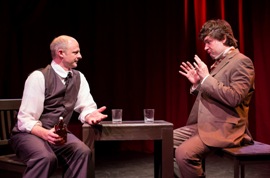 Schoenberg (Troy Blendell) might have believed his marriage to Mathilde Zemlinsky (Amanda Lovejoy Street) to be a match made in musical heaven, but he too found the course of true—or not-so-true—love less than smooth when Mathilde embarked on her own torrid affair with painter Richard Gerstl (Jesse Fair).
Schoenberg (Troy Blendell) might have believed his marriage to Mathilde Zemlinsky (Amanda Lovejoy Street) to be a match made in musical heaven, but he too found the course of true—or not-so-true—love less than smooth when Mathilde embarked on her own torrid affair with painter Richard Gerstl (Jesse Fair).
Anyone expecting a happy ending—let alone three of them—had better look elsewhere than Fugue.
On the other hand, those in the mood for an evening of theater both challenging and gratifying will find much to savor in Smith’s follow-up to his multi-award-nominated Firemen, one that reunites him with master director Chris Fields, and excitingly so indeed.
Even a less adventurous playwright might well have opted, as Smith does here, to write a single play about these three unrelated composers. They do, after all, share similarities (illicit passion, forbidden love, lethal attraction) despite their stories having taken place in three different centuries, and that play might have unfolded as three successive one-acts, or a single play alternating between scenes of one triangle, then the next, then the next.
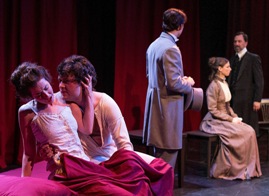 Smith takes a far more daring route, and a more ultimately satisfying one, by constructing Fugue like … well, like a fugue. In fact, once a series of individual scenes have introduced each threesome to us one by one, much of the rest of Fugue transpires with all three trios onstage at once, left, right and center, conversations either bouncing in fuguelike counterpoint from one group of speakers to another to another, or with identical lines of dialog spoken in unison, sometimes by two characters, sometimes by three, each in his or her own time zone and, in true-fugue fashion, never more than three at once.
Smith takes a far more daring route, and a more ultimately satisfying one, by constructing Fugue like … well, like a fugue. In fact, once a series of individual scenes have introduced each threesome to us one by one, much of the rest of Fugue transpires with all three trios onstage at once, left, right and center, conversations either bouncing in fuguelike counterpoint from one group of speakers to another to another, or with identical lines of dialog spoken in unison, sometimes by two characters, sometimes by three, each in his or her own time zone and, in true-fugue fashion, never more than three at once.
A demanding approach indeed, not just for the audience but for an ensemble who must not only stay in his or her character’s own “moment” but be constantly aware of what’s being said elsewhere onstage.
Period piece Fugue may be, and its characters’ speech more formal than vernacular, but it’s hard to imagine any but the most contemporary playwright integrating so much sex and violence (and sexual violence) into a theatrical work. Fugue is, if anything, cutting-edge, and in more ways than one.
It’s often quite thrilling as well, and never more so than in the evening’s most striking sequence, one which has three sex (or sexless) scenes going on at once, each one illustrating the dynamic of the relationship in question—one woman an eager participant, the second one giving in against her will, and the third getting no action whatsoever from a disinterested spouse.
The cast assembled by Echo Theater simply could not be better, Blendell, Dietze, Fair, Herlinger, Huen, Keitel, Shaw, Street, and Syquia all doing dynamic, gutsy work (including plenty of simulated sex and violence), with special snaps to the meatier-roled Blendel, Herlinger, and Shaw, and most especially to Herlinger for a mad scene that would do the finest Shakespearean proud.
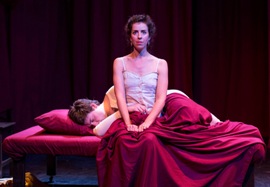 Scenic designer Amanda Knehans surrounds the stage in blood-red velvet curtains, like those of a concert hall, allowing Michael Mullen’s spectacular costumes to define the period in question, both designs exquisitely lit by Matt Richter. Add to this Drew Dalzell’s superb sound design, one which integrates the music of all three composers, and you’ve got an absolutely terrific looking and sounding production.
Scenic designer Amanda Knehans surrounds the stage in blood-red velvet curtains, like those of a concert hall, allowing Michael Mullen’s spectacular costumes to define the period in question, both designs exquisitely lit by Matt Richter. Add to this Drew Dalzell’s superb sound design, one which integrates the music of all three composers, and you’ve got an absolutely terrific looking and sounding production.
Fugue is produced by Rebecca Eisenberg and Fields. Samantha McCann is production stage manager.
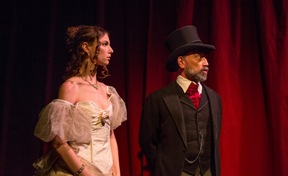 With six of its nine actors appearing courtesy of Actors’ Equity, Fugue is the kind of intimate theater production likely to be made impossible should AEA’s draconian revision of its 99-seat plan go into effect in a matter of months.
With six of its nine actors appearing courtesy of Actors’ Equity, Fugue is the kind of intimate theater production likely to be made impossible should AEA’s draconian revision of its 99-seat plan go into effect in a matter of months.
It is not merely as an endangered species, however, that Fugue deserves an audience’s attention. It is above all an evening of theater at its most exciting, daring, and rewarding.
Atwater Village Theatre, 3269 Casitas Ave, Atwater Village. Through March 22. Fridays and Saturdays at 8:00. Sundays at 7:00. Reservations: 310 307-3753
www.EchoTheaterCompany.com
–Steven Stanley
March 6, 2015
Photos: Darrett Sanders
Tags: Arnold Schoenberg, Carlo Gesualdo, Echo Theater Company, Los Angeles Theater Review, Pyotr Ilyich Tchaikovsky



 Since 2007, Steven Stanley's StageSceneLA.com has spotlighted the best in Southern California theater via reviews, interviews, and its annual StageSceneLA Scenies.
Since 2007, Steven Stanley's StageSceneLA.com has spotlighted the best in Southern California theater via reviews, interviews, and its annual StageSceneLA Scenies.







 COPYRIGHT 2024 STEVEN STANLEY :: DESIGN BY
COPYRIGHT 2024 STEVEN STANLEY :: DESIGN BY